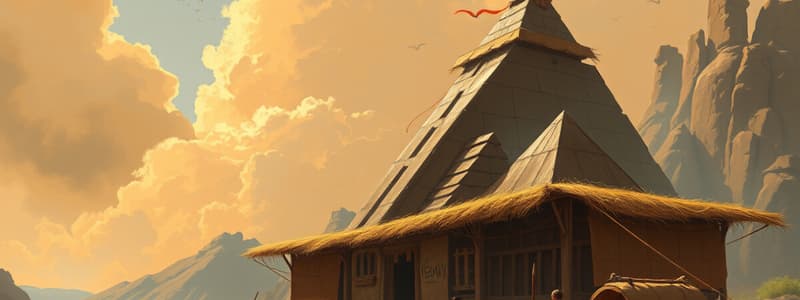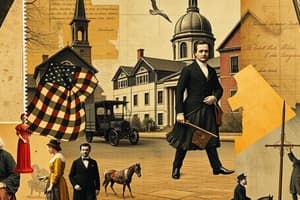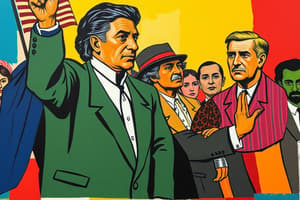Podcast
Questions and Answers
What was the Neolithic Revolution?
What was the Neolithic Revolution?
- The introduction of the printing press
- The rise of acute population pressure
- The transition from hunting and gathering to farming (correct)
- The establishment of cities
What characterized North American societies before outside contact?
What characterized North American societies before outside contact?
Small bands of people living in isolation.
Describe the state of European societies before outside contact.
Describe the state of European societies before outside contact.
Acute population pressure, constant warfare, new ideas, Protestant Reformation, and large nation-states.
What were African societies like before outside contact?
What were African societies like before outside contact?
What did the Treaty of Tordesillas confirm?
What did the Treaty of Tordesillas confirm?
Who were the conquistadores?
Who were the conquistadores?
What was the ecomienda system?
What was the ecomienda system?
Who was John Cabot?
Who was John Cabot?
What did Jacques Cartier accomplish?
What did Jacques Cartier accomplish?
What was the significance of the House of Burgesses?
What was the significance of the House of Burgesses?
What did the Mayflower Compact establish?
What did the Mayflower Compact establish?
What was the Great Migration?
What was the Great Migration?
Who was Roger Williams?
Who was Roger Williams?
What is antinomianism?
What is antinomianism?
What did the Toleration Act achieve?
What did the Toleration Act achieve?
What characterized the Columbian Exchange?
What characterized the Columbian Exchange?
What were the primary reasons for English settlers coming to North America?
What were the primary reasons for English settlers coming to North America?
Describe Spanish accomplishments in opening the New World to exploration.
Describe Spanish accomplishments in opening the New World to exploration.
Flashcards are hidden until you start studying
Study Notes
Neolithic Revolution
- Transition from hunting and gathering to farming around 8000 BCE in Central America.
- Development of agriculture significantly altered human societies.
North American Societies Before Contact
- Characterized by small bands living in isolation, with distinct local cultures.
European Societies Before Contact
- Marked by population pressures, frequent warfare, the spread of new ideas (due to the printing press), the Protestant Reformation, and the emergence of large nation-states.
African Societies Before Contact
- Composed of villages and larger cities situated along trade routes, alongside nomadic herding populations in the Sahara.
Treaty of Tordesillas
- Brokered by the pope, this treaty established Portugal's rights around Africa to India and Spain's claims to most of the newly discovered lands in the Americas.
Conquistadores
- Spanish explorers and soldiers seeking wealth, religious conversion, and fame, driven by the “3-G’s”: gold, God, and glory.
Encomienda System
- A feudal-like system granting Spanish colonists control over conquered lands, requiring Indigenous people to provide labor and share their harvests.
John Cabot
- Italian explorer whose 1497 expedition for England resulted in the claim of North America, exploring from Nova Scotia to Newfoundland.
Giovanni de Verrazano
- Italian explorer noted for exploring the Atlantic coast of North America.
Jacques Cartier
- French explorer credited with exploring the St. Lawrence River and claiming parts of Canada for France between 1491 and 1557.
John Calvin
- French humanist who founded Calvinism, influencing European religious thought significantly.
Martin Luther
- German theologian who triggered the Protestant Reformation by advocating that salvation is granted through faith alone.
Henry VIII
- King of England from 1509 to 1547; initiated the English Reformation by establishing the Church of England due to a dispute with the pope.
Joint-Stock Companies
- Investment groups allowing investors to pool resources while limiting individual financial liability, facilitating joint colonial ventures.
Francis Drake
- English explorer and admiral; the first Englishman to circumnavigate the globe and played a key role in defeating the Spanish Armada.
Sir Humphrey Gilbert
- Established the first English colony in Newfoundland in 1583 but died at sea on an exploratory mission.
Walter Raleigh
- Favored courtier of Elizabeth I who attempted to establish the Virginia colony (Roanoke).
Roanoke
- Founded in 1587, known as the “Lost Colony.” Settlers disappeared without a trace, creating ongoing historical intrigue.
Richard Hakluyt
- Promoted English colonization in the New World, advocating for settlement to alleviate labor surpluses and challenge Spain.
James I
- Succeeded Elizabeth I; his persecution of Puritans led many to immigrate to America.
London Company
- A group of merchants responsible for funding the founding of Jamestown, Virginia.
Captain John Smith
- Strict leader of the Jamestown settlement who implemented discipline necessary for survival.
Jamestown
- Established in 1607, it was the first permanent English settlement in North America.
John Rolfe
- Made Jamestown economically viable by perfecting tobacco cultivation and marrying Pocahontas.
Powhatan Indians
- Indigenous tribes around Jamestown who provided food and agricultural knowledge, engaging in frequent conflicts with settlers.
House of Burgesses
- Established in 1619 as the first elected legislative assembly in the New World, allowing some self-governance in Virginia.
Royal Colony
- A colony directly controlled by a monarch, such as the English Crown.
Puritans
- Protestant reformers aiming to purify the Anglican Church of Catholic influences, settled in the Massachusetts Bay Colony.
Anglican Church
- The national church of England, founded by Henry VIII following his break with the Roman Catholic Church.
Arminianism
- 16th-century theological doctrine opposing Calvinist predestination, emphasizing human free will.
Separatists
- Known as Pilgrims, these individuals sought to separate from the Church of England for a distinct religious practice.
William Bradford
- The second governor of Plymouth Colony; instrumental in establishing land ownership and managing colony challenges.
Of Plymouth Plantation
- A historical account of the Plymouth Colony written by William Bradford.
Samoset
- Native American leader who first engaged with the Pilgrims, selling land to them in 1625.
Squanto
- A Native American who aided English settlers by teaching agricultural techniques and acting as a liaison with his tribe.
Mayflower
- The ship that carried Pilgrims to Massachusetts in 1620.
Mayflower Compact
- Signed in 1620, this was the first framework for self-government in America, establishing a governing body for Plymouth Colony.
Pilgrims
- English Puritans who founded Plymouth Colony in 1620 seeking religious liberty.
John Winthrop
- Leader of early settlers of the Massachusetts Bay Colony, emphasizing community and religious values.
Great Migration
- The migration of over 15,000 Puritans to Massachusetts between 1630 and 1640 to escape persecution.
Massachusetts Bay Colony
- Formed in 1630, noted for establishing a representative government influenced by Puritan ideals.
Roger Williams
- A dissenting clergyman advocating separation of church and state; founded Providence, Rhode Island after his banishment.
Anne Hutchinson
- Preached women's ability to have direct communication with God; expelled from Massachusetts, leading to the founding of New Hampshire.
Antinomianism
- The belief that faith and grace free individuals from moral law, central in Hutchinson's teachings.
Rhode Island
- Founded by Roger Williams as a haven for religious tolerance and democratic governance.
Thomas Hooker and Connecticut
- Founded Connecticut in 1639 and played a key role in drafting its "Fundamental Orders."
Fundamental Orders
- Considered the first written constitution in America, enacted in 1639 to establish a representative government in Connecticut.
Pequot War
- Conflict in 1637 resulting primarily from land disputes, leading to the virtual destruction of the Pequot tribe.
Metacom
- Chief of the Wampanoag, led King Philip’s War (1675), a major conflict between Native Americans and English settlers.
King Philip's War
- A significant conflict in 1675 aimed at expelling English settlers from New England, marking a pivotal moment in colonial-indigenous relations.
Proprietors
- Individuals granted extensive land rights through charters by the king to establish colonies.
Maryland
- Founded by Lord Baltimore as a refuge for Catholics and established religious tolerance through the Act of Toleration.
Lord Baltimore
- Founder of Maryland, he aimed to create a colony that offered religious freedom, primarily for Catholics.
Toleration Act
- Legislation allowing religious freedom for all Christians in Maryland to maintain peace between religious factions.
Charleston
- The first permanent settlement in the Carolinas, established in 1690, largely inhabited by Huguenot refugees.
New Amsterdam
- Originally a Dutch settlement, later captured by the English and renamed New York.
New Sweden
- Established in 1638, it included southern New Jersey, parts of Pennsylvania, and Delaware before succumbing to Dutch control.
Duke of York
- Brother of Charles II; received land between Connecticut and Maryland, leading to the English capture of New Amsterdam.
Quakers
- Dissenters from the Church of England advocating for pacifism, equality, and religious freedom, notably founding Pennsylvania.
William Penn
- Quaker leader who founded Pennsylvania, promoting a society based on democracy and fair treatment of Native Americans.
Holy Experiment
- Penn's vision for Pennsylvania emphasizing religious freedom and equitable relations with Indigenous peoples.
Columbian Exchange
- The interchange of crops, livestock, diseases, and technologies between the Americas and the rest of the world following Columbus's voyages.
Reasons for English Settlement in North America
- Seeking religious freedom, land access, and economic opportunities prompted English migration.
Spanish Accomplishments in New World Exploration
- Spain pioneered European exploration in the Americas, securing substantial territories and resources while decimating Indigenous populations.
Role of Massachusetts Bay as English Settlement Center
- A central Puritan settlement that influenced surrounding colonies, became a model of governance and community.
Requirements for Successful Colonization
- Establishing peaceful relations with Native Americans, land knowledge and agricultural practices, effective leadership, and cultural acceptance are critical for colonization success.
Studying That Suits You
Use AI to generate personalized quizzes and flashcards to suit your learning preferences.




